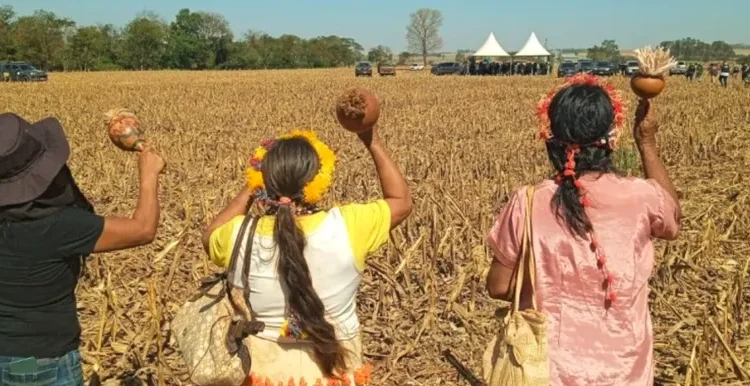On Monday night (22), Indigenous Guarani Kaiowá lived through yet another terror scene in the town of Douradina, Mato Grosso do Sul. Dozens of pick-up trucks with around 100 farmers turned on their headlights towards an ancestral area of the Panambi-Lagoa Rica Indigenous Land that was retaken by the Guarani Kaiowá people. The big farmers threatened to attack the Indigenous people who occupied, on July 13, an ancestral land overlapped by Cleto Spessatto's farm. The Indigenous territory has already been recognized and delimited, but the demarcation process has been stalled since 2011.
Since occupying this part of the territory, the Guarani Kaiowá are under attack and one Indigenous man was shot in the leg. Tension is ongoing, with a farmers' camp just a few meters from the land retaken.
“This is our land. We are Guarani Kaiowá and for hundreds of years we have been waiting for our land to be demarcated,” says one of the leaders of the retaking action. “It's full of ruralists here. They say we're invaders. We're not invaders. We are the nature of the land. This [land] is our source [of life],” he says.
“They killed, massacred and spilt the blood of the Guarani Kaiowá people, and in 2024 this problem continues. We need more security. They're armed there,” warned the Kaiowá leader. “We don't want a fight. We just want our land [back]. So far, nothing has been resolved. So, we're occupying [the area] and no one is leaving because this is our area. We're not here to play games,” he said.
Aty Guasu, the Great Guarani Kaiowá Assembly, is “asking for help” and claims that Indigenous peoples are “under attack”. In a statement, it denounces that “farmers are destroying tents in the Panambi Indigenous Land recently retaken”. “Farmers are stealing our land, objects and utensils. We want justice,” says Aty Guasu.
According to the Indigenous Missionary Council (Cimi, in Portuguese), groups from the Ministry of Indigenous Peoples “and its attempts to negotiate with landowners and local politicians to stop hostilities” have not been enough.
“There was no presence of a more effective state apparatus to achieve real solutions – and even the visit to the regions of public authorities with political relevance. The actions of the National Force have been criticized,” Cimi points out.
Farmers talk about using more violence
A video being shared on social media shows part of what happened on Monday night (22). The footage was taken by a man standing next to the pick-up trucks lined up. “Bamboo is going to bend,” says the man who recorded the video, expressing the farmers' intentions to beat the Guarani Kaiowá. “Let's move forward. Everyone is organizing for the big conflict. There are the índios [a pejorative term used to refer to Indigenous peoples]."
“Pollon is coming with the leaders. Let's get here, let's get here,” the man calls out. He is referring to federal deputy Marcos Pollon (Liberal Party). On his Instagram profile, the congressman posted videos of the farmers' vigil, confirming that the farm overlapping the Indigenous land belongs to farmer Cleto Spessatto and that the “supposed Indigenous people” are “causing terror.”
Brasil de Fato contacted Pollon asking for a statement on the situation and the attacks on Indigenous people in the state of Mato Grosso do Sul. There was no reply by the time this article was finished, but we remain open should the founder of the pro-gun movement wish to comment.
The report also contacted Cleto Spessato. His consultant disputed the theory that the land is Indigenous territory and had been invaded by farmers. “Everyone here has a document,” he said. He also stated that the deed dates back to the time of former Brazilian President Getúlio Vargas (1934-1945). It was precisely in the 1940s that the Brazilian state expelled Indigenous people from their territories in Mato Grosso do Sul to confine them into reserves.
The land retaking in the town of Douradina is one of 12 others attacked by farmers in July alone. In addition to the Kunumi tekoha, in the town of Caarapó, Mato Grosso do Sul, conflicts are currently taking place against the Kaingang and Guarani Mbya Indigenous peoples in the state of Rio Grande do Sul, the Avá-Guarani in the state of Paraná, the Parakanã in the state of Pará and the Anacé in the state of Ceará.
Stalled land demarcation contributed to the rise in violence against Indigenous people
New data from the report on violence against Indigenous peoples, released by the Indigenous Missionary Council (CIMI) on Monday (22), reveals that government actions to protect and assist communities were insufficient the previous year. According to CIMI, more than 1,200 cases of property violations committed in Brazil against this population were recorded in 2023.
Conflicts in Indigenous territories are attributed to legal insecurity, resulting in severe cases, including deaths. In 2023, more than 200 murders and 35 attempted murders were recorded, an increase of 180 deaths in 2022. In a note sent to the news outlet InfoAmazonia at the beginning of July, the Ministry of Justice reported that the demarcation of new Indigenous lands is at a standstill due to the lack of definition of the “Marco Temporal” Bill or the so-called timeframe thesis.
The landmark thesis establishes that Indigenous peoples can only claim land where they were when the Constitution was promulgated in 1988. However, the Federal Supreme Court (STF) has already declared the timeframe thesis unconstitutional.




